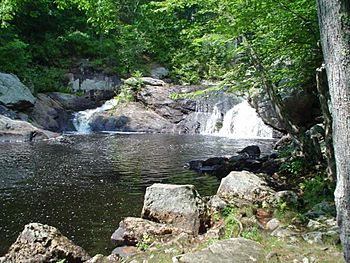Isinglass River facts for kids
Quick facts for kids Isinglass River |
|
|---|---|

Locke's Falls, Isinglass River
|
|
| Country | United States |
| State | New Hampshire |
| County | Strafford |
| Towns and city | Strafford, Barrington, Rochester |
| Physical characteristics | |
| Main source | Bow Lake Bow Lake Village 515 ft (157 m) 43°14′30″N 71°9′9″W / 43.24167°N 71.15250°W |
| River mouth | Cocheco River Rochester 110 ft (34 m) 43°13′58″N 70°56′58″W / 43.23278°N 70.94944°W |
| Length | 15.0 mi (24.1 km) |
| Basin features | |
| Tributaries |
|
The Isinglass River is a 15-mile-long river in southeastern New Hampshire, United States. It flows through Strafford County. The river starts at Bow Lake in Strafford. It also gets water from other ponds like Ayer's, Nippo, Round, and Long ponds in Barrington.
The Isinglass River flows east. It eventually joins the Cochecho River in Rochester. This river is part of the larger Piscataqua River watershed. A watershed is an area of land where all the water drains into one main river.
In 1892, a book about Rochester, N.H., suggested the river's name came from mica. Mica is a shiny mineral found in the riverbed or along its banks. Isinglass is another word for mica.
Contents
Protecting the Isinglass River
The Isinglass River is very special. It is one of only 15 rivers in New Hampshire recognized for its amazing natural and cultural features. To keep it that way, a plan called the Isinglass River Management Plan was created. This plan helps protect the river, its banks, and the whole area around it.
A group called the Isinglass River Local Advisory Committee (IRLAC) helps carry out this plan. Their main goal is to protect the river's natural beauty, places for fun activities, and its history. They work to keep the river in its natural state. They also try to limit new buildings along the river and its smaller streams.
The IRLAC also works to prevent the loss of forests near the river. They make sure no new dams are built. They also prevent changes to the river's path that could cause harm. Keeping the water clean and healthy is another big part of their job. The towns of Barrington and Strafford, and the city of Rochester, all support this important plan.
How the Protection Started
In 2000, some middle school students from Barrington started a group. They called themselves "Kids of the River." With help from two parents, they formed the Isinglass River Protection Project (IRPP). They learned all about the river. Their goal was to protect and save it.
These students even spoke to the New Hampshire House of Representatives. They asked for the Isinglass River to be named a special river under the NH Rivers Management and Protection Plan (RMPP). Their hard work paid off! In 2002, the river officially became a designated river. After this, the Isinglass River Local Advisory Committee (IRLAC) was formed. Several members of the IRPP, including the students, joined this new committee.
Moving Forward with River Protection
In 2004, the IRLAC received a special grant. It was called "Isinglass River Management Plan: Building Public Awareness and Support." They used this money to tell everyone about the river's new status. They also showed people why it was so important to protect the river's natural resources. Their goal was to get the whole community involved in saving the river.
The committee started checking building plans and road construction projects. They wanted to make sure these projects would not harm the river. They also began testing the water in different places along the river. Over the years, the water quality has actually gotten better!
Success Stories for the River
In 2008, a big project proposed by the town of Strafford was ranked number one in the entire country. This project was eligible for federal funding. It helped stop a large housing development that would have built 58 homes. This development would have taken up 7,800 feet of land right along the Isinglass River.
The river is now used for many fun activities. People enjoy hiking, fishing, and kayaking there. Waste Management of NH, a company in Rochester, has also helped. They created hiking trails and encourage people to protect the area. One of their trails leads to Locke's Falls. This is one of the most beautiful spots along the river.
There are many public places to fish. The New Hampshire Fish and Game Department adds about 5,000 Brook and Rainbow Trout to the river every year. Water quality tests show great improvements. Levels of dissolved oxygen, pH, and other measures now meet the standards for a Class B river. This means the water is healthy. The efforts by both the state and local groups have truly helped save one of New Hampshire's last natural rivers. Today, local committees continue to work hard. They make sure the river stays protected with as little building as possible along its banks.
 | Anna J. Cooper |
 | Mary McLeod Bethune |
 | Lillie Mae Bradford |



